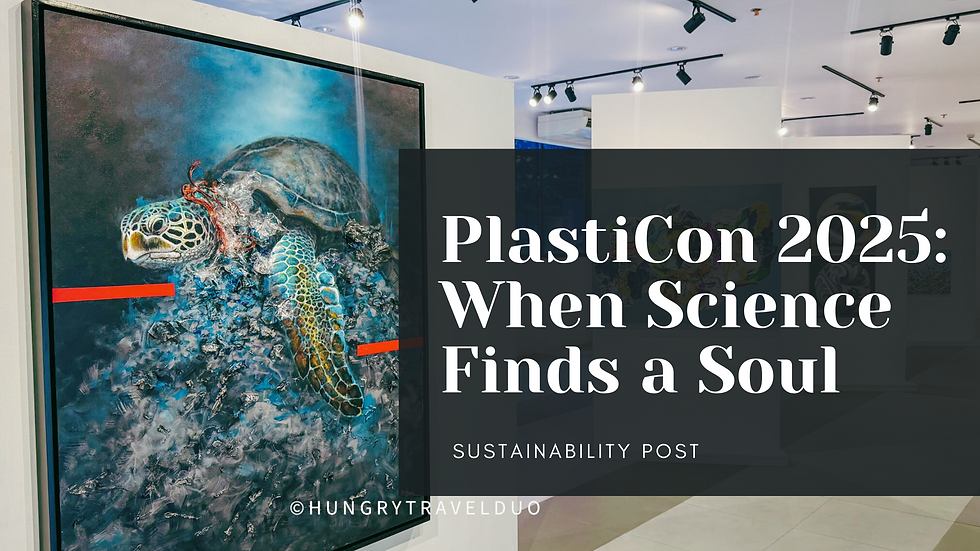From Waste to Worth: Empowering the Informal Sector in the EPR Era
- Hungrytravelduo
- Jan 27
- 4 min read
Did you know that the Philippines is one of the world’s largest contributors to plastic waste, generating around 2.7 million tons of plastic annually, with an estimated 20% leaking into the ocean?

Despite this alarming reality, the backbone of the country’s waste management system consists of the informal waster sector or IWS —waste pickers, junk shop operators, and community recyclers—who work tirelessly to collect and process recyclables, yet often lack recognition and support.
The Extended Producer Responsibility (EPR) law in the Philippines is a crucial step toward addressing this crisis by holding producers accountable for the entire life cycle of their products. However, the success of this law heavily depends on the inclusion of the informal waste sector, whose contributions remain undervalued and unsupported. This concern was reiterated during the Solid Waste Management Summit 2025, hosted by the Department of Environment and Natural Resources (DENR), where stakeholders emphasized the need to recognize and empower informal waste workers in EPR implementation.

The Role of Women and the Informal Sector in Waste Management
Women, particularly mothers, serve as key decision-makers in their households, determining which products to buy and how to manage household waste. If empowered with the right tools and support, they can actively participate in local recycling initiatives and promote better waste segregation practices within their communities. As highlighted by Dr. Onda in my previous article on Turning the Tide, their involvement is essential in shaping sustainable waste solutions at the community level.
At the barangay level, where many informal waste workers are engaged in livelihood programs, providing proper training and access to financial support can enhance their capacity to contribute effectively. For example, mothers involved in waste collection initiatives could be trained in efficient sorting methods, more upcycling ideas and techniques, and the use of digital tools to track waste.
Challenges Hindering Full Integration of the EPR Law
Despite their contributions, the informal waste sector faces significant challenges that hinder their full participation in the EPR law implementation. These include:
Lack of Comprehensive Data Systems: There is no accurate tracking of waste collected and processed by informal workers, leading to undervaluation of their efforts.
Fragmented Infrastructure: Currently, there are only 12,855 Materials Recovery Facilities (MRFs) servicing 19,459 barangays, meaning only 49% of barangays nationwide have access to proper waste processing facilities. This limits the efficiency of waste segregation and recycling efforts.
Low Plastic Pricing: Junk shops, which serve as key buyers of recyclable plastics, offer extremely low prices, making it difficult for waste collectors to earn a sustainable income. This discourages participation and further exacerbates economic challenges in the informal sector.
High Implementation Costs: Compliance with EPR requirements can be expensive, making it difficult for small-scale waste collectors to participate fully. At the tailend, recycling programs often face sustainability issues due to the absence of a steady stream of buyers for upcycled products and alternative plastic solutions. Without consistent demand, these initiatives struggle to generate stable income, discouraging waste workers from engaging in plastic recycling efforts under the EPR law.
Opportunities for Improvement
To overcome these challenges and maximize the potential of the informal waste sector, several opportunities can be explored:
Digital Collection and Monitoring: Implementing blockchain-based apps can provide transparency and fair compensation for waste collectors while improving data tracking.
Capacity Building and Education: Training programs on waste management best practices can empower the informal sector to enhance their efficiency and knowledge.

A silver lining I saw are the IWS-centered programs that the Solid Waste Management Association of the Philippines (SWAPP) has been implementing for years. By forging close partnerships between LGUs and IWS groups, EPR implementation trickles down to the grassroots level.
Governmental and Policy Support: Offering tax incentives to companies that support the informal sector’s involvement in EPR can encourage broader corporate participation.
Integration of Circular Economy Principles: Creating demand for locally recycled materials can stimulate economic opportunities and close the recycling loop.
Expansion of Recycling Infrastructure: Establishing more recycling hubs across barangays will provide better access to facilities and resources for waste collectors.
A Call to Action: Capacitating the Informal Sector
For the EPR law to succeed, we must empower the informal waste sector with the tools, policies, and resources it needs. We urge government agencies, especially at the LGU level, to fast-track policy implementation and budgeting of IWS programs nationwide; businesses to prioritize inclusive partnerships; and communities to actively support waste segregation. The time to act is now—how much longer can the informal sector wait?
Two decades have passed since the Ecological Solid Waste Management Act of 2001, yet essential provisions remain poorly implemented. Half of the country’s barangays still lack access to MRFs, and waste collectors struggle with unsustainable incomes due to low plastic pricing. Can we afford to wait another 20 years for the informal sector to be fully integrated?
The informal waste workers have long carried the weight of waste management, but their efforts remain undervalued and unsupported. It's time for action—government, businesses, communities, and civic organizations must come together to create an inclusive system that recognizes and elevates the informal sector as vital partners in building a sustainable future.
By investing in education, infrastructure, and financial support, the Philippines can tap into the full potential of the informal sector, driving a circular economy that benefits all. Let’s empower those who have always been the backbone of our waste management system.



























Comments